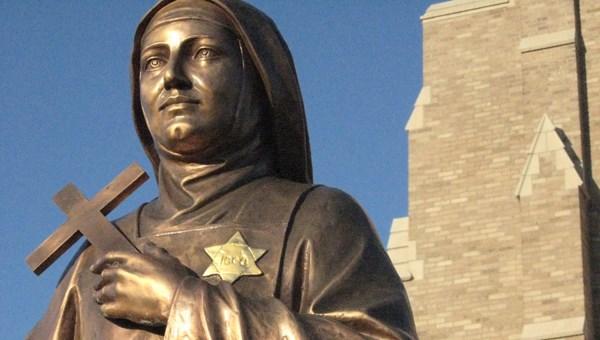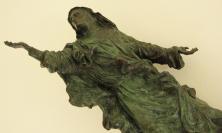On 9 August 1942, the philosopher Edith Stein – St Teresa Benedicta of the Cross, Discalced Carmelite – was murdered at Auschwitz. In 1999, Pope St John Paul II made her one of the six patron saints of Europe. Joe Egerton explains why this matters to us today.
On 26 July 1942, the Dutch Catholic bishops condemned ‘the unmerciful and unjust treatment meted out against Jews by those in power in our country.’ Arthur Seyss-Inquart[1] retaliated by ordering the deportation of all Jewish converts to Catholicism in the Netherlands. Among these were the Discalced Carmelite Edith Stein (who had taken the religious name Teresa Benedicta of the Cross) and her sister, Rosa, who had joined her in religious life. As they left the convent at Echt, Edith said to her sister: ‘Come, we are going for our people.’ On 9 August 1942, Edith and Rosa Stein were murdered at Auschwitz.
We might never have known the name of Edith Stein had her writings not attracted the attention of a professor at Lublin, Karol Józef Wojtyła, who had earlier studied at Rome under the great Dominican neo-Thomist, Reginald Garrigou-Lagrange.[2] Karol Wojtyła shared with Edith Stein an enthusiasm for the works of St Thomas Aquinas, and participated at Lublin in a longstanding project of integrating the philosophical approach called phenomenology – of which Edith Stein was a distinguished practitioner[3] – with Thomism. On 16 October 1978, Karol Wojtyła was elected pope and on 1 May 1987, as Pope John Paul II, he beatified Edith Stein, ‘a daughter of Israel who, as a Catholic during Nazi persecution, remained faithful to the crucified Lord Jesus Christ and, as a Jew, to her people in loving faithfulness’:
We bow down before the testimony of the life and death of Edith Stein, an outstanding daughter of Israel and at the same time a daughter of the Carmelite Order, Sister Teresa Benedicta of the Cross, a personality who united within her rich life a dramatic synthesis of our century. It was the synthesis of a history full of deep wounds that are still hurting ... and also the synthesis of the full truth about man.
Edith Stein’s conversion
Edith Stein was born into a devout Jewish family in Breslau in 1891. As a teenager she lost her faith in God: ‘I consciously decided, of my own volition, to give up praying’. She went on to study philosophy, a discipline in which she was to excel, but was denied a professorial chair first because she was a woman and later because of her Jewish blood. Over time, she acquired the Christian faith. A key moment was towards the end of the First World War, when in April 1918 she went to console Anna Reinach, whose philosopher husband had fallen in Flanders in November 1917. Edith Stein, like others, found that rather than consoling Anna, they were consoled by her: ‘she evinced a power in her life that had transformed her grief.’[4] Edith Stein was later to describe this as ‘my first encounter with the cross and the divine power it bestows on those who carry it’.
Another significant step on her conversion was her discovery of St Ignatius Loyola’s Spiritual Exercises, which, according to the Jesuit philosopher Erich Przywara[5], she came across in a bookshop while she was still an atheist: ‘It interested her first only as a study of psychology, but she quickly realised that it was not something to read but to do’. But the text that had the strongest impact on her was the autobiography of St Teresa of Avila, which she picked up in the summer of 1921 while staying with friends. Her response was that she had to follow the path of St Teresa, the Carmelite path, and thus to become a Catholic, although she was somewhat surprised to discover that she could not, on being received into the Church, immediately become a Carmelite.[6]
Although from her first encounter with St Teresa, Edith Stein felt called to the contemplative life as a Discalced Carmelite, following advice from her spiritual mentors, she first worked to promote the role of women[7] and was recognised as one of Germany’s most effective advocates for women playing a major role in the professions and society. However, after Hitler came to power, Edith Stein was unable to work effectively in Germany and at that point entered the Carmel, taking the name of Benedicta of the Cross. She initially was received into the Carmel in Cologne, but as Nazi persecution of Jews grew, she was sent to Holland, where her sister joined her. In 1940, Hitler invaded Holland and in 1942 the Gestapo entered the Carmel at Echt during morning prayer and took away Edith and Rosa Stein. In her last months, Edith Stein had been working on a book to mark the fourth centenary of the birth of St John of the Cross in 1542. The manuscript of what is today available in English as The Science of the Cross[8] was left in her room when she was deported to Auschwitz.
A wrongly disregarded philosopher
Edith Stein has been largely ignored by philosophers. One reason, no doubt, is that she has been canonised. As Alasdair MacIntyre drily observed:
Among the prejudices of most [academic] philosophers is a belief not only that what makes a philosopher a good philosopher is one thing and what makes someone a saint in the judgment of the Catholic church is another – which is true – but that saintliness, unless you have been dead for a very, very long time, precludes philosophical merit.[9]
Yet a century ago, in times similarly turbulent to our own, Edith Stein used her powerful intellect and rigorous philosophical training to ask and answer questions that have come back to haunt us today. In a few short sentences that pick up a main theme of Catholic philosophy from St Thomas Aquinas to St John Paul II’s Fides et Ratio, namely that the Church does not endorse any school of philosophy but values the pursuit of truth, MacIntyre tells us why we should study Edith Stein:
Stein’s writings, both early and late, are not so much an invitation to agreement as they are an invitation to rethink the issues with which she was concerned. And since she generally and characteristically identified those issues that were and are philosophically crucial, this makes her a significantly more important thinker than she has often been taken to be.
Edith Stein’s account of the state
The relationship between ‘the state’ and ‘the people’ is at the core of much of the controversy that surrounds Brexit, and it is something that Edith Stein studied at great length. She did so both as a philosopher and psychologist who had investigated our knowledge of other minds[10] and how humans work together,[11] and as somebody who had played an active role in the German Democratic Party (DDP), pledged to the creation of a democratic republic after the abdication of Kaiser Wilhelm II.
Her thoughts on the matter took her on a journey. In 1917, she had written:
We can become aware of the wholes to which we belong... and can voluntarily submit to them. The more lively and powerful such a consciousness becomes in a people, the more it forms itself into a ‘state’, and this formation is organisation. A state is a people [Volk] conscious of itself that disciplines its functions. …that Volk is most perfect which is most a state.[12]
A hundred years later a similar notion of the state was to be articulated by Mr Boris Johnson, during his tenure as Foreign Secretary, invoking John Stuart Mill’s 1861 book, Representative Government:
[Brexit] is to fulfil the liberal idealism of John Stuart Mill himself, who recognised that it is only the nation – as he put it, ‘united among themselves by common sympathies which do not exist between themselves and others’. Only the nation could legitimate the activities of the state.[13]
Yet in An Investigation into the State[14] – completed in 1921 but not published until 1925 (the same year as Adolf Hitler’s Mein Kampf) – Edith Stein offers a radically different account, one in which she has separated the concepts of ‘nation’ and ‘state’.
The nation or ‘people’ is now seen as a community with shared values and culture, but this does not entail that the nation be a state – Poland had survived and indeed flourished even without a state. The distinctive feature of a state is sovereignty, and if it is to function effectively it must be recognised freely as sovereign by its citizens. Where there is too little in common between on the one hand the goals pursued and the values upheld by the state, and on the other hand the goals and values that inform the communal life of citizens, the state will depend on the coercive use of force[15]. The state, according to Edith Stein, can enter into treaties that bind its government to act in certain ways without losing its sovereignty – so long as it can also withdraw from those treaties. The treaties establishing the European Union do require its member governments to act in certain ways but they do not remove the sovereignty of any state.
Edith Stein does not offer a definitive answer to the question of what sort of relationship the United Kingdom should have with the EU. But anyone who accepted her account of the state would regard the way in which Brexit is currently debated – by the use of terms like ‘the will of the people’ and ‘betraying the referendum’ – as a serious intellectual error. Such phrases have a rhetorical effect, but they have no referent. This is not to deny that there are meaningful arguments against, say, a second referendum – the Archbishop of Canterbury’s speech in the Lords on 7 March 2017 is a model of how this case can be presented objectively.[16] But the conclusions of arguments that incorporate a false account of the state can never be secure. One reason that the present debates – not just over whether the UK should leave but also over how it should leave – have become so toxic is a failure to ask, let alone answer questions that Edith Stein posed about the nature of the state a hundred years ago.
An important further contribution of Edith Stein to political philosophy is her denial that the nation is the largest community to which a human being can belong. She is emphatic that each of us belongs to an overarching community, which is the whole of humankind. Some of those who support Brexit do so because they believe that leaving the EU will enable the UK to play a global role. That argument can only be valid if all humanity – especially those most disadvantaged – benefit, if the common good of all people of all nations is the aim.
Co-patroness of Europe
In Fides et Ratio, Pope St John Paul II gave us a reason to pay attention to Edith Stein’s writings:
One thing is certain: attention to the spiritual journey of [Edith Stein] can only give greater momentum to both the search for truth and the effort to apply the results of that search to the service of humanity[17].
When he went on to mark the coming of a new millennium by proclaiming St Edith Stein, St Bridget of Sweden and St Catherine of Sienna as co-patronesses of Europe, he set the former’s life before us as an example:
Today's proclamation of Edith Stein as a Co-Patroness of Europe is intended to raise on this Continent a banner of respect, tolerance and acceptance which invites all men and women to understand and appreciate each other, transcending their ethnic, cultural and religious differences in order to form a truly fraternal society.[18]
As we face the turmoil of Brexit and the reappearance of authoritarianism and anti-Semitism, we can ask St Teresa Benedicta of the Cross to intercede for us and ask for the aid of the Holy Spirit in order to turn this vision of Europe into a reality.
Joe Egerton was awarded the Robert Schuman Silver Medal for European Unity in 1985.
[1] Arthur Seyss-Inquart was executed at Nuremburg on 16 October 1946. Before he died he returned to the Catholic faith of his youth, receiving the Sacrament of Penance from Father Bruno Spitzl OSB.
[2] Fr Reginald Garrigou-Lagrange OP (1877 - 1964) taught at the Angelicum in Rome from 1909 to 1960 and served for many years as a consulter to the Holy Office and other Roman Congregations.
[3] Fides et Ratio (§74) places Edith Stein in distinguished company: ‘The fruitfulness of this relationship is confirmed by the experience of great Christian theologians who also distinguished themselves as great philosophers, bequeathing to us writings of such high speculative value as to warrant comparison with the masters of ancient philosophy. This is true of both the Fathers of the Church, among whom at least Saint Gregory of Nazianzus and Saint Augustine should be mentioned, and the Medieval Doctors with the great triad of Saint Anselm, Saint Bonaventure and Saint Thomas Aquinas. We see the same fruitful relationship between philosophy and the word of God in the courageous research pursued by more recent thinkers, among whom I gladly mention, in a Western context, figures such as John Henry Newman, Antonio Rosmini, Jacques Maritain, Étienne Gilson and Edith Stein and, in an Eastern context, eminent scholars such as Vladimir S. Soloviev, Pavel A. Florensky, Petr Chaadaev and Vladimir N. Lossky.’
[4] Alasdair MacIntyre, Edith Stein: A Philosophical Prologue, 1913-1922 (Rowan & Pitman, 2006), p. 165.
[5] Author of Analogia Entis, and included in a list of German theologians who have enriched the entire Church by Pope St John Paul II in an address in 1980.
[6] MacIntyre Edith Stein, p. 167.
[7] Edith Stein’s work on promoting the role of women in society deserves a study of its own; her robust approach is set out in Essays On Woman (The Collected Works of Edith Stein, Vol 2). ICS Publications, based in Washington, D.C., is the publishing house of the Institute of Carmelite Studies (ICS) and a ministry of the Discalced Carmelite Friars of the Washington Province (U.S.A.). The Institute of Carmelite Studies promotes research and publication in the field of Carmelite spirituality, especially about Carmelite saints and related topics. They have a project for publishing the works of Edith Stein in English https://www.icspublications.org/ Most of the volumes are available in both paperback and as Kindle. Some can be downloaded as pdfs.
[8] The Science of the Cross (The Collected Works of Edith Stein, Vol 6); translated by Josephine Koeppel OCD; edited by Dr. L. Gelber and Romaeus Leuven OCD ICD.
[9] MacIntyre, Edith Stein, p. viii
[10]In her doctoral thesis, published in English as On the Problem of Empathy, translated by Waltraut Stein PhD, and published by ICS.
[11] See Philosophy of Psychology and the Humanities (The Collected Works of Edith Stein, Vol 7), translated by Mary Catharine Baseheart and Marianne Sawicki; edited by Marianne Sawicki (ICS Publications).
[12] Letter to Roman Ingarden, ‘Letter no 7’ (p. 9) in Edith Stein: Self portrait in Letters, translated by Josephine Koepel OCD (ICS Publications). Quoted in MacIntyre, Edith Stein, p. 93.
[13] ‘Uniting for a Great Brexit: Foreign Secretary's speech’ (14 February 2018): https://www.gov.uk/government/speeches/foreign-secretary-speech-uniting-for-a-great-brexit. Mill did not say ‘the nation justifies the state’ – the earlier words come from chapter 16 of Considerations on Representative Government, https://ebooks.adelaide.edu.au/m/mill/john_stuart/m645r/chapter16.html.
[14] Edith Stein, An Investigation Concerning the State (The Collected Works of Edith Stein, Vol 10), edited and translated by Marianne Sawicki (ICS Publications).
[15] I am adopting here MacIntyre’s summary: see p. 95 ff. of Edith Stein.
[16] https://www.archbishopofcanterbury.org/speaking-and-writing/latest-news/european-union-archbishop-canterburys-speech-lords-debate
[17] Fides et Ratio, §74.
[18] Spes Aedificandi (1999), §9: https://w2.vatican.va/content/john-paul-ii/en/motu_proprio/documents/hf_jp-ii_motu-proprio_01101999_co-patronesses-europe.html






